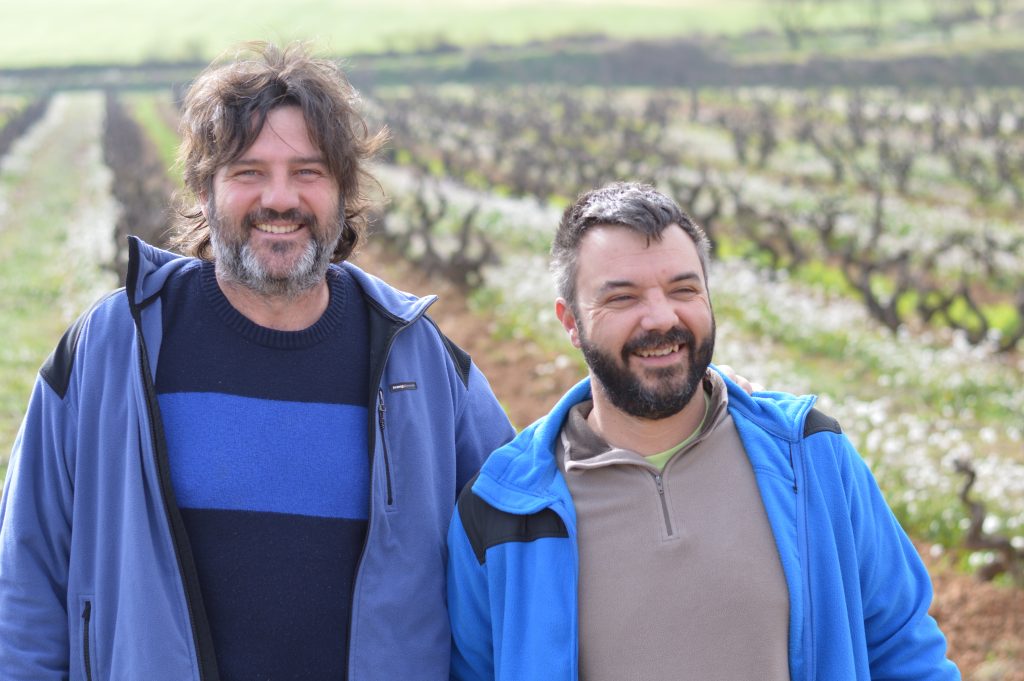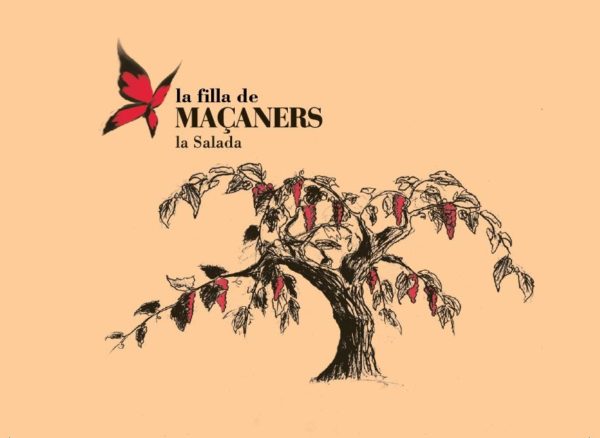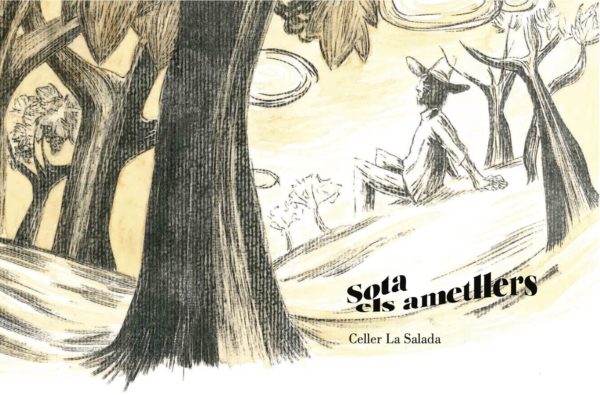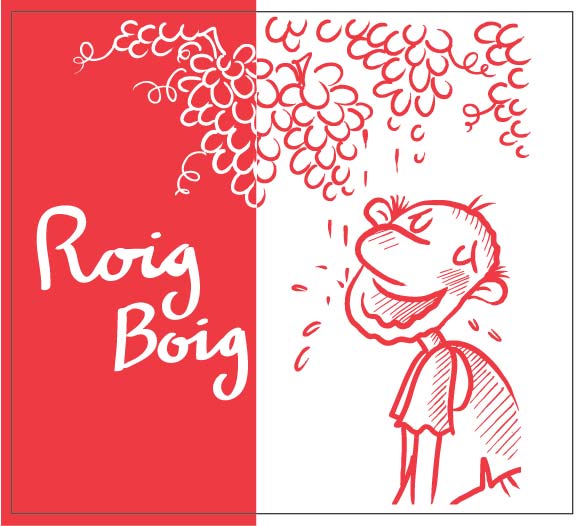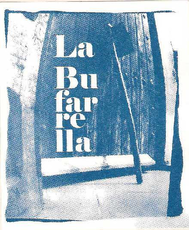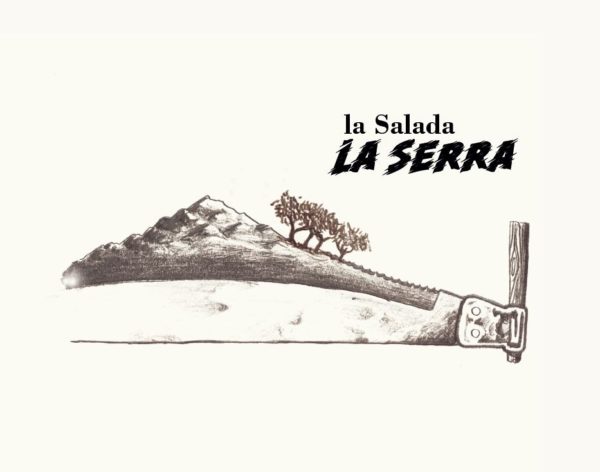La Salada

Toni Carbó and Anna Serra are the hardworking folks behind Celler La Salada in the Penedès; Toni founded the winery in 2012 after working exclusively on the Mas Candí wines with his longtime friend and partner Ramón Jané. (He’s still one half of Mas Candí, but La Salada is the individual project on which he and Anna work solo.)

The La Salada wines are among some of the most progessive and vibrant in the Coeur portfolio: Toni’s deep feeling for the rural heritage of Catalan farmers and his entrenchment in the vines are the defining principles; all the vines are tended by hand; biodynamic practices are employed; no-till farming is the standard; zero additives of any kind are ever included in the wines. There’s a joyfulness in each bottling, a light-filled quality, softness, energy, a light touch. Even though La Salada doesn’t make the most technically perfect wines in the world, these are among some of the most personality-driven and luminous we know.
"Toni Carbó translates consistently translates his earthy charm into some of Spain's most exciting and expressive natural wine." - Andrew Yandell, Trumpet Wine
Wines
El Pagès Content Blanc
Varietal: Parellada, Macabeu, Xarel.lo
Color: White
Farming Practice: Biodynamic
Biodynamic. 45% Parellada, 50% Macabeu, 5% Xarel.lo. Direct pressing and co-ferment for one month inside a cairons, a large, old-school Catalan underground fermenter lined with tile, used by previous generations of La Salada family and recovered in 2018. Kept in the cairons for four months’ aging after ferment. 5% of Xarel.lo macerated on the skins for two weeks. Both the Pagès Content blanc and orange come from the same plots of vineyards each year, though percentages vary. Both wines are always based on Macabeu, Xarel.lo and Montònec (Parellada); these are the majority of the vineyards at La Salada. 2021 was a drought year, so more Macabeu and Montòneg were used than Xarel.lo in this bottling—the former are planted on more fertile soils and have better yields in water-strained years. In general, the Pagès Content wines are meant to honor the Catalan farming families of the past who worked the land as a vocation with enthusiasm and love. They’re the inspiration for these easygoing wines, based on whichever fruit the year grants. Unfined, unfiltered, zero SO2 added.
El Pagès Content Negre
Varietal: Ull de llebre, Merlot, various local red varieties
Color: Red
Farming Practice: Biodynamic
Biodynamic. 40% Ull de llebre, 40% Merlot, 20% various local red varieties (Sumoll, Rogenc, Cannonnau, Mònica,Torbat, and more, a Mas Candí parcel planted in 2005). The Ull de Llebre and Merlot were fermented together and are from two different plots. The 20% of local red grapes are typically found in the Roig Boig cuvée: about 400L didn’t fit into the one large Roig Boig tank; so they blended it together with the Ull de Llebre and Merlot, resulting in a fresher wine they liked for the Pagès Content bottling. 50% destemmed, 50% whole cluster fermentation for two weeks, both performed in stainless steel tanks. In general, the Pagès Content wines are meant to honor the Catalan farming families of the past who worked the land as a vocation with enthusiasm and love. They’re the inspiration for these easygoing wines, based on whichever fruit the year grants. Unfined, unfiltered, zero SO2 added.
El Pagès Content Orange
Varietal: Macabeu, Xarel.lo, Sumoll
Color: Orange
Farming Practice: Biodynamic
Biodynamic. 85% Macabeu, 10% Xarel.lo, 5% Sumoll. Two weeks’ worth of whole-cluster fermentation and maceration; afterward, pressed off to finish fermentation inside a cairons, a large, old-school Catalan underground fermenter lined with tile, used by previous generations of La Salada family and recovered in 2018. Aged for six months in stainless steel tanks afterward. Both the Pagès Content blanc and orange come from the same plots of vineyards each year, though percentages vary. Both wines are always based on Macabeu, Xarel.lo and Montònec (Parellada); these are the majority of the vineyards at La Salada. In general, the Pagès Content wines are meant to honor the Catalan farming families of the past who worked the land as a vocation with enthusiasm and love. They’re the inspiration for these easygoing wines, based on whichever fruit the year grants. Unfined, unfiltered, zero SO2 added.
La Filla del Maçaners
Varietal: Sumoll, other native red varieties
Color: Red
Farming Practice: Biodynamic
Biodynamic. 98% Sumoll, 2% other native red varieties. A new single-vineyard wine that is in homage to an old vineyard, Els Maçaners. ‘La Filla del Maçaners’ is a 2014 selection massale planting of the original Els Maçaners vineyard in the village of Castelladral—a centenarian vineyard of Sumoll with a small smattering of other extremely rare local varieties interplanted (Bertrol, Carregarucs, Pansera, others…). Previously, La Salada had produced a red wine from off this Maçaners vineyard, but the old farmer who owns it is unable to continue in its possession; however, he did give winemakers Toni and Anna the go-ahead to take cuttings from its rare vines. Now we have ‘the Daughter of Maçaners,’ which will become a new heritage vineyard for the winery. All fruit is done whole cluster, pressed by foot, with two weeks fermenting in open amphora; it’s then pressed off and aged in closed amphoras for another six months. Sumoll is an intensely rustic and tannic grape—we liken it to the Catalan Nebbiolo, but from the Alto Piemonte—and it shows in this concentrated, wild fruit. Not a red for quaffing; an ageworthy and meditative version of one of the Penedès’ most ancient varieties.
Macabeu ‘L’Ermot’
Varietal: Macabeu
Color: White
Farming Practice: Biodynamic
Biodynamic. 100% Macabeu. L’Ermot typically is made from a special 1ha, 80 year-old parcel planted on clay-calcaire in 1942, done with green cover since 2008. However, in 2020, due to serious mildew, and in ’21 year due to severe drought, the L’Ermot vineyard was blended with another single-vineyard parcel of Macabeu called Gana, immediately next to Toni’s house—Gana was planted 1965 on sandy loam, done with green cover since 2014. Both heritage vineyards give naturally low yields and very small, concentrated grapes. Given this concentration, L’Ermot is always made direct press, but in ’21 due to the drought, and seeing as many of the fermentations at La Salada had been difficult, this wine had 24 hours of skin maceration before ferment to try to obtain more yeast from the skins. The Macabeu from both plots was then pressed, co-fermenting in a stainless steel tank and remained there until bottling. Unfined, unfiltered, zero SO2 added. Softly aromatic, citrus blossom and salt wash. A delicate expression of this aromatic variety.
Malvasia de Sitges ‘Sota Els Ametllers’
Varietal: Malvasia de Sitges
Color: White
Farming Practice: Biodynamic
Biodynamic. 100% Malvasia de Sitges. This single vineyard is a special plot, surrounded by forests and a grove of almond trees, from which it derives its name, ‘Under the Almonds.’ Highly sand-dominant soils mean that even though the vineyard is relatively young, planted in 2013, the vineyard gives concentrated and powerfully aromatic fruit. Toni and Anna also say it’s one of their favorite vineyards because of how close it feels to the rest of nature: one can always hear the birds singing in Ametllers. The Malvasia de Sitges sees two weeks’ worth of maceration, 80% of the fruit done whole-cluster and foot-pressed, 20% destemmed. Fermented in stainless steel, rested in tank until bottling. Unfined, unfiltered, zero SO2 added. The most kaleidoscopic of the La Salada wines: jasmine, tangerine, sandalwood, sand, gardenia. Ametllers still manages to be light, nimble, and refreshing on the palate, despite its beguiling aromatics we might normally associate with a saccharine quality or weight.
Roig Boig
Varietal: Sumoll, Roigenc, Mandó, Cannonnau, Monica, Torbat, Parellada, Xarel·lo
Color: Red
Farming Practice: Biodynamic
Biodynamic. A field blend of Catalan native varieties, both red and white: Sumoll, Roigenc, Mandó, Cannonnau, Monica, Torbat, Parellada and Xarel·lo. The vineyard was planted in 2006 in calcareous clay soil. Manual harvest in 10 kg boxes, with selection of the grapes in the vineyard. The grapes are chilled down and 90% of them are direct pressed. The other 10% is macerated for 4 months with virtually no extraction to limit color and tannins. Indigenous yeasts and no additions; unfined/unfiltered. Fermented and aged in stainless steel.
Roig Boig Metode Ancestral Penedes
Varietal: Sumoll, Roigenc, Mandó, Cannonnau, Monica, Torbat, Parellada, Xarel·lo
Color: Red
Farming Practice: Biodynamic
Biodynamic. A field blend of Catalan native varieties, both red and white: Sumoll, Roigenc, Mandó, Cannonnau, Monica, Torbat, Parellada and Xarel·lo. The vineyard was planted in 2006 in calcareous clay soil. Manual harvest in 10 kg boxes, with selection of the grapes in the vineyard. The grapes are chilled down and 90% of them are direct pressed. The other 10% is macerated for 4 months with virtually no extraction to limit color and tannins. Indigenous yeasts and no additions; unfined/unfiltered. Fermented in stainless steel and bottled near the end of fermentation to capture CO2. There’s a bit of grip on the sparkler this year – very pretty, delicate or rose-like fruit and flowers, but notable tannic structure coming from the Sumoll!
Xarel.lo ‘La Bufarella’
Varietal: Xarel-lo
Color: White
Farming Practice: Organic, Biodynamic
Organic, biodynamic. 100% Xarel.lo. ‘La Bufarella’ is a single vineyard of 1.1ha, planted in 1982 and located between Pla del Penedès and Subirats on a steep north-facing slope—it’s one of La Salada’s prime vineyards. 95% destemmed, 5% whole cluster, six months’ worth of maceration. Natural fermentation with no additions in stainless steel tanks. Aged in steel and bottled with the lunar calendar directly from tank without filtration or racking, so the first bottles have less sediment than the last (just a heads up here!). La Bufarella is a vibrant, expressive version of what Xarel.lo can be, not as robust and opulent as the variety can also demonstrate. Light, stone-fruited, and gently mineral.
Xarel.lo ‘Vinya La Fusta’
Varietal: Xarel-lo
Color: White
Farming Practice: Biodynamic
Biodynamic. 100% Xarello. The La Fusta Vineyard was planted in 1988 and sits on calcareous clay soils. The vineyard is not tilled, this is true minimal intervention agriculture. The objective is to have the highest variety life in the soil and create a natural balance within the environment. Manual harvest in 10 kg boxes, with selection of the grapes in the vineyard. Cold maceration then spontaneous fermentation in 50% second use chesnut barrels and 50% stainless steel. Aged for 6 months. Bottled with zero SO2.
Xarel.lo ‘La Serra’
Varietal: Xarel.lo
Color: White
Farming Practice: Biodynamic
Biodynamic. 100% Xarel.lo. This single vineyard wine is located at the top of a very rocky ridge called La Sierra de Can Rossell (or La Serra in Catalan). La Serra is a southwest-facing, 1ha plot planted in 2008; it is surrounded by olive trees and river stones are prominent throughout its clay-calcaire soil. Two weeks’ worth of maceration, 80% destemmed, with 20% of the fruit done whole-cluster and foot-pressed. Fermented in stainless steel tanks, left in tank until bottling. Unfined, unfiltered, no SO2 added. First produced in 2018. Herbal, subtle, shimmery with minerals, not nearly as weighty and round as Xarel.lo in the Penedès can be.




